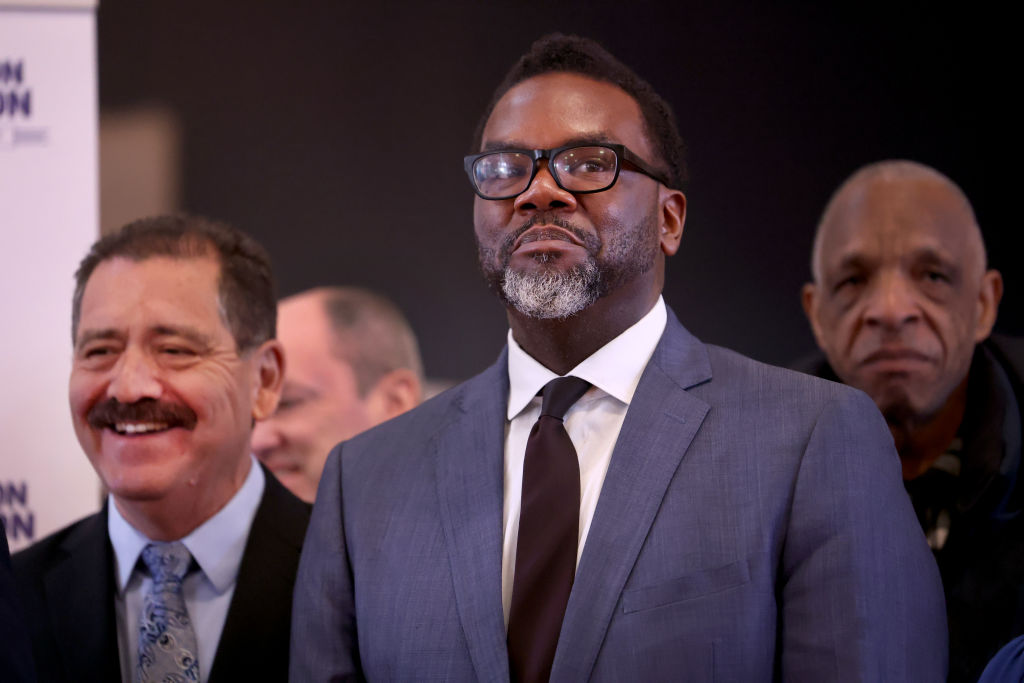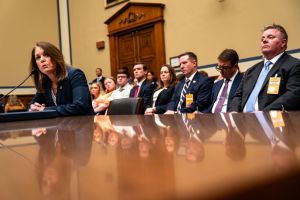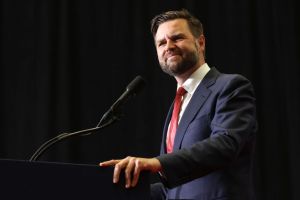Spoilt for choice in the Windy City
If the heavy defeat suffered by incumbent mayor Lori Lightfoot last month is anything to go by, Chicagoans have plenty to grumble about when it comes to how their city is managed. But when they head to the polls in the mayoral runoff next week, they cannot complain about a lack of choice. The two candidates are both Democrats, to be sure, but they offer sharply different approaches on the crime and public safety — issues that have dominated the race and which polls suggest are at the forefront of voters’ minds.
Paul Vallas, who used to run the city’s public schools, is running in the moderate lane: sharply critical of Lightfoot and prioritizing public safety above all else. Brandon Johnson is the progressive option. He blames rising crime on underinvestment in public services and has had to spend the campaign backpedaling on past support for defunding the police, something that he once said should be “an actual political goal.” One slightly reductionist way of framing the race is as a contest between the police union’s preferred candidate (Vallas) and the teachers’ union’s pick (Johnson): both a sign of the times given the Covid-era focus on crime and school closures, and a time-honored tale of powerful Chicago interest groups proving decisive in the city’s politics.
But for all the ways in which the two candidates offer voters in the Windy City a clear choice, a Manhattan Institute poll finds a more muddled picture when it comes to what the Chicago electorate really wants. The results show clear frustration with the increasing violence in the city: 54 percent of Chicago voters, including 51 percent of black voters, say that crime and public safety are their top concern ahead of the election. The next issue on the list, taxes and spending, registers just 10 percent. A clear majority of voters say the city feels unsafe. (Among black voters, 61 percent of respondents said the city felt unsafe versus 37 percent who say it is safe.) Overwhelming majorities want tougher penalties for shoplifting (80 percent) and car theft (89 percent). A clear majority wants the city to hire more police.
So one would assume Vallas, the self-styled tough-on-crime candidate, would be cruising to victory. The MI poll does put him ahead, but only by five points (44 percent to 39 percent). Other polls show a race about which it is tough to predict with any confidence. Manhattan Institute scholar Rafael A. Mangual notes the disconnect between the public’s overwhelming concern over public safety and crime, and the fairly tight race in a piece for City Journal. He finds part of the answer to the mystery in support for bail reform (albeit by a narrow margin) and recent restrictions on the police’s ability to engage in foot pursuits. “The old wisdom about avoiding the soft-on-crime label,” writes Mangual, “may be due for an update. Even in a race in which concerns about public safety are at the forefront of voters’ minds, there’s no guarantee that a ‘tough-on-crime’ message will win the day.”
Perhaps this is a sign that hard-learned lessons about crime and justice are easily forgotten — and that even as things get worse in the Windy City, voters aren’t quite ready to admit the difficult trade-offs involved in policing and public safety. That is a worrying thought, though one in keeping with the tone of the conversation about crime in cities in recent years. For all the talk about lessons learned and Democrats tacking to the center, these policy changes are all happening within fairly narrow guardrails: elected Democrats now admit that maybe police are necessary after all; the District of Columbia cannot rely on its own elected officials to put its residents’ safety first, as we learnt with the recent scuffle over its crime bill. And so, we are once again confronting the worrying thought we pointed to in our March Spectator editorial on this subject: that things will have to get worse before they can get better.
On our radar
Is “David” porn? An expression of Western civilization at its finest or smut that kids shouldn’t be exposed to? Perhaps surprisingly, teachers at a Florida school took a look at Michelangelo’s “David” and decided it was the latter. Florence mayor Dario Nardella called the conclusion “ridiculous.”
Harris goes to Africa The vice president will spend the next seven days in Africa, where she will visit Ghana, Zambia and Tanzania in an effort to counter Chinese overtures on the continent.
Trump lawyer won’t defend Trump Joe Tacopina, an attorney for Donald Trump, said “I’m not his social media consultant” in response to questions about the former president’s inflammatory posts about “death and destruction” that would follow should he face criminal indictment. Tacopina said the posts were “ill-advised.”
*** Sign up to receive the DC Diary in your inbox here ***
Bibi backtracks
Weeks of protests reached a fever pitch after Sunday’s firing of defense minister Yoav Gallant by Israeli prime minister Benjamin Netanyahu for questioning the judicial reforms proposed by the new government. Israel’s Histadrut labor union threatened a massive strike, reservists in the IDF pledged to refuse training and the country largely ground to a halt until Netanyahu spoke to the nation earlier today announcing that the reforms would be delayed to “give a genuine opportunity for dialogue.”
Histadrut has since reneged on its call for a strike, and opposition leader Yair Lapid, who had until recently refused to negotiate with Netanyahu’s coalition, has said he would be open to discussions.
However, the reforms are not being abandoned; they are just being postponed due to the escalating crisis. The most controversial components of the reform include the modification of the selection procedure for Supreme Court justices and the override provision. The former will give the elected government greater weight in the selection of judges, as opposed to the current procedure which consists of a committee of the Israeli Bar Association, court justices and politicians — meaning unelected officials presently have effective veto power over appointments. The override provision would give the Knesset the ability to throw out a Supreme Court ruling by simple majority vote.
It is unclear how Netanyahu’s coalition will fare going forward, as the members on his right flank were until today outright opposed to any postponement. Itamar Ben-Gvir, an extreme-right member of the coalition, only acceded to the postponement after receiving apparent approval for a new National Guard subordinate to his Ministry of National Security. It is far from obvious whether a compromise solution is possible given the vast chasm between the government and the opposition.
Expect unrest and divisive political wrangling to continue as the hard work of negotiation gets underway.
–John Pietro
In Waco without water
Cockburn was in Waco, Texas, this weekend, covering the first official rally of Trump’s 2024 presidential campaign. He nearly passed out from both physical and political exhaustion.
Despite using his press pass to bypass the line, Cockburn’s populist streak led him to refrain from joining the other hacks ensconced on the press dais. After having his vape confiscated by the TSA, he chose instead to meander through the crowd of cranky boomers murmuring about the lack of water amid the sweltering Texas heat, which approached ninety degrees on the tarmac of the Waco Regional Airport.
The crowd came back to life as Trump Force One theatrically lapped the airport to the theme of Kenny Loggins’s “Danger Zone,” though by that time Cockburn was already tired, sunburned, sore and ready to go home.
As the former president emerged from his aircraft to open his first rally by rehashing January 6, relitigating the 2020 election and pretending he hadn’t already had four years to fix things, Cockburn strained to recapture the level of vigor he felt when Trump first ran in 2015 and Trump-labeled water bottles were plentiful.
Those around him were undeniably excited, though Cockburn felt fatigued again as he found his mind wandering and his fingers forgetfully fumbling his pockets in vain search of his stolen vape.
As he decided to join the steady stream of many others who were leaving early, a weary Cockburn noticed a truck packed with water bottles pulling up just a bit too late. If DeSantis runs and hopes to gain the edge over his likely opponent, his campaign managers would do well to remember that the pomp and glory of politics wither when your supporters are thirsty.
–Cockburn
From the site
Peter W. Wood: How real is America’s discontent?
Neal Pollack: The unstoppable march of the gambling giants
Matt Purple: Why didn’t America’s Covid hypocrites pay a price?
Poll watch
PRESIDENT BIDEN JOB APPROVAL
Approve 43.2% | Disapprove 52.1% | Net approval -8.9 (RCP average)
POTENTIAL 2024 MATCH UPS
Biden vs. Trump
Biden: 41% | Trump: 45%
Biden vs. DeSantis
Biden: 41% | Trump: 44%
Harris vs. Trump
Harris: 38% | Trump: 48%
Harris vs. DeSantis
Harris: 38% | DeSantis: 46%
(Harvard-Harris)
Best of the rest
Aaron Zitner, Wall Street Journal: Americans pull back from values that once defined US
Alan Suderman and Sam Mettz, AP: Amid strained US ties, China finds unlikely friend in Utah
Damon Linker, Notes from the Middleground: Trump’s path back to the presidency
Sara Fischer, Axios: Americans hooked on Chinese apps
Nicole Gelinas, City Journal: One bank, indivisible
Matthew Yglesias, Slow Boring: Nostalgia economics is totally wrong





















